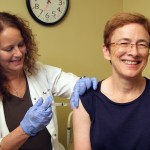An outbreak of measles in the state of Washington last year sickened 19 children. Of those who fell ill, 18 had something in common—they were not vaccinated.

Saad Omer aims to increase vaccine compliance to prevent childhood diseases.
For Emory Rollins School of Public Health researcher Saad Omer, the Washington outbreak is a perfect example of the effect on an entire community when individuals are unimmunized. His research aims to shed light on ways to encourage increased vaccine compliance for adults and their children.
Omer says vaccine-preventable diseases such as measles, influenza, and pertussis often start among persons who forego vaccinations, spread rapidly within unvaccinated populations, and also spread to other subpopulations.
In a recent New England Journal of Medicine article, Omer and his colleagues reviewed evidence from several states showing that vaccine refusal due to nonmedical reasons puts children in communities with high rates of refusal at higher risk for infectious diseases such as measles and whooping cough.
Even children whose parents do not refuse vaccination are put at risk because “herd immunity” normally protects children who are too young to be vaccinated, who can’t be vaccinated for medical reasons, or whose immune systems do not respond sufficiently to vaccination.
Research findings indicate that everyone who lives in a community with a high proportion of unvaccinated individuals has an elevated risk of developing a vaccine-preventable disease.
Read more about Omer’s research on vaccine refusals in the fall 2009 issue of Public Health magazine.
Omer also discusses the importance of vaccinating against the H1N1 virus in an Oct. 16 article in The New York Times.










 A new method of rapidly producing highly targeted monoclonal antibodies could soon be used to rapidly diagnose H1N1 influenza. Just a month after vaccinating people with a seasonal flu vaccine, the researchers were able to use just a few tablespoons of the vaccinated individuals’ blood to generate antibodies against that specific strain of flu. The
A new method of rapidly producing highly targeted monoclonal antibodies could soon be used to rapidly diagnose H1N1 influenza. Just a month after vaccinating people with a seasonal flu vaccine, the researchers were able to use just a few tablespoons of the vaccinated individuals’ blood to generate antibodies against that specific strain of flu. The